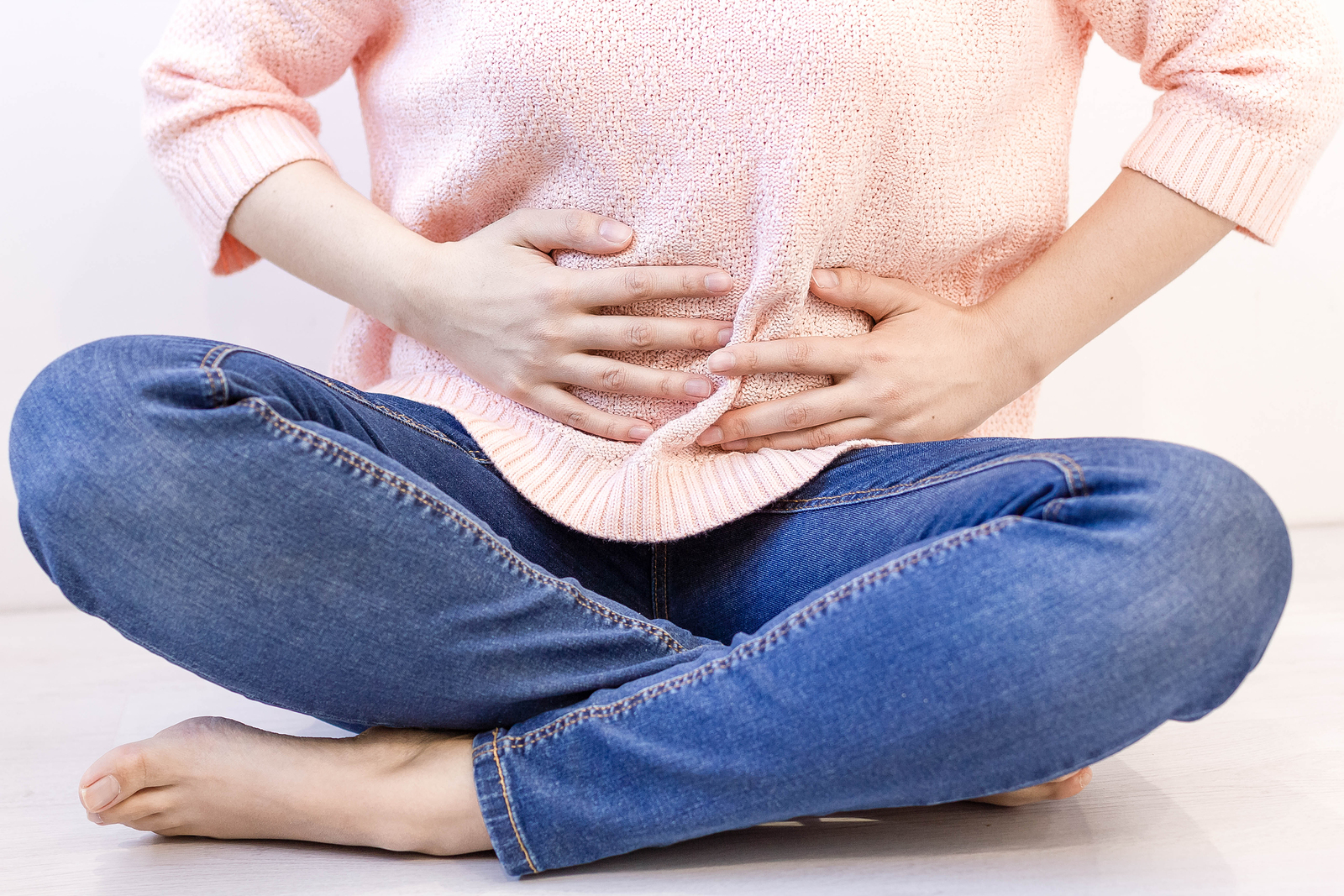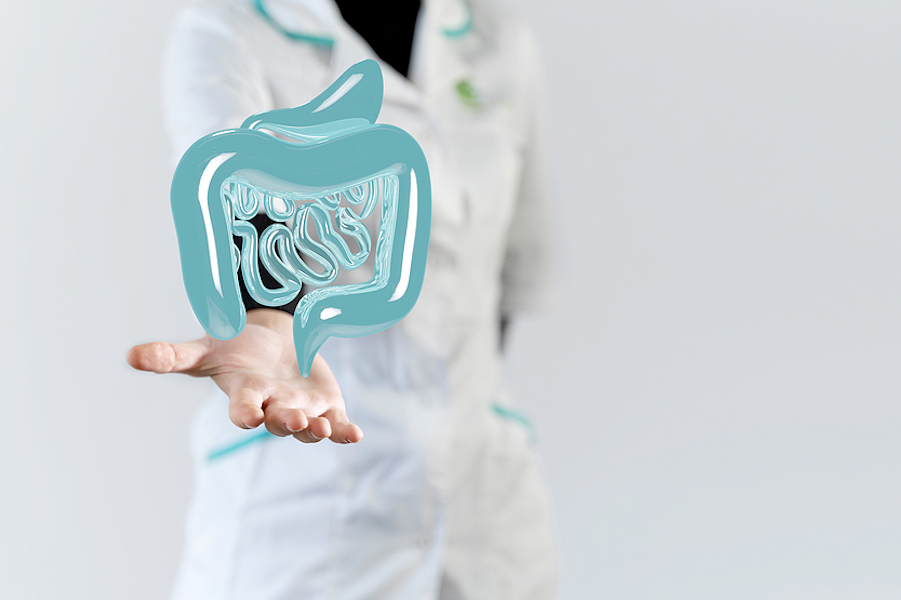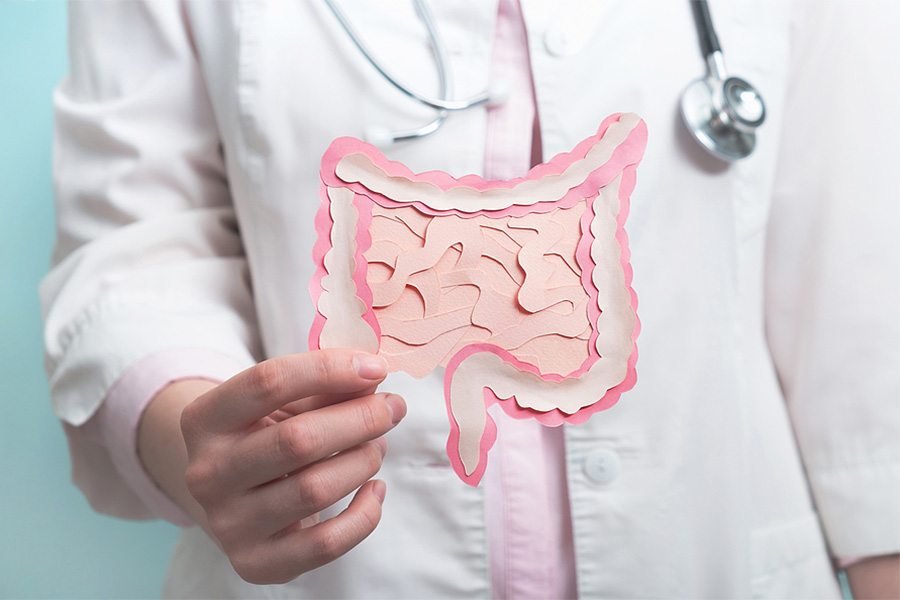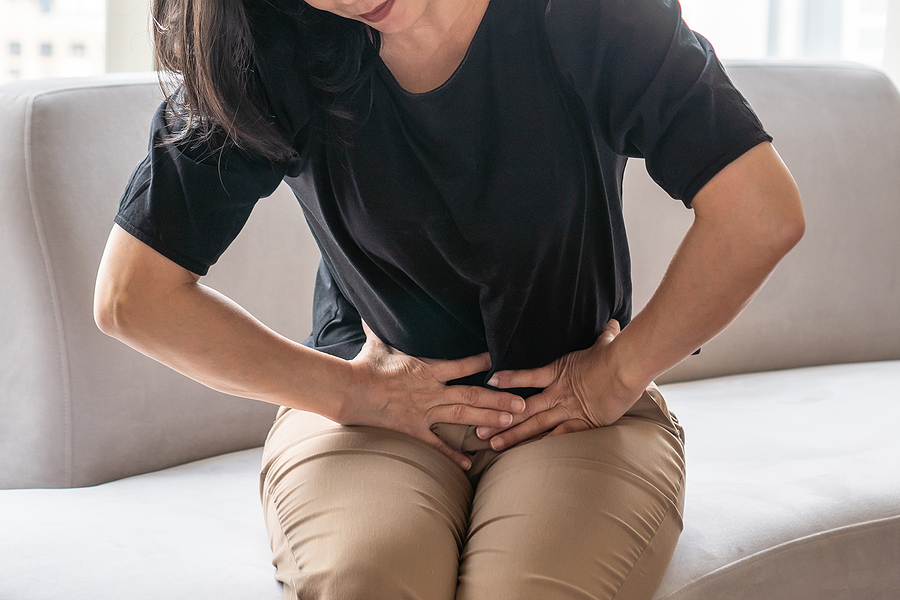Women with irritable bowel syndrome (IBS) often tell me their lives are being run by their bowels. They’ve stopped going out to dinner, taking trips or doing much of anything. It feels like they have tried everything — from increasing fiber and loading up on Metamucil to finally filling a prescription for antidepressants out of desperation. By the time these women get to my door, they’re fed up and don’t know what else to do for their IBS symptoms.
The US Department of Health and Human Services reports that up to one in five Americans has irritable bowel syndrome (sometimes also called “spastic colon”) and 75% of them are women. But the problem is poorly understood by general practitioners, and many women with IBS symptoms come away from their doctors feeling little is being offered to truly help them. Instead of getting at root causes, conventional medicine too often depends on medications that simply mask the symptoms. What’s worse is the fact that some practitioners are claiming irritable bowel syndrome is all in the patient’s head.
I know irritable bowel syndrome can completely rule a woman’s life. I also know that it stems from more than just our thoughts or from daily stress. While there is clearly a mind-body connection at play, IBS arises for many different reasons, and in the same way, there are many successful alternative approaches to relieve it. You don’t have to focus your life around irritable bowel syndrome anymore. Your life can be different — I promise.
Let’s go beyond the IBS symptoms and take a closer look at what might be leading to your discomfort, so you can begin to heal your gut problems at the source and enjoy the health you deserve.
Irritable Bowel Syndrome: A Catch-All Diagnosis
Irritable bowel syndrome is just what the phrase implies — a syndrome. That means that not only is the bowel irritated, but a whole constellation of symptoms and causes is found in association with IBS, not just one specific pathology. Scientists haven’t discovered physiological evidence of disease in the bowel, so a clear-cut definition has yet to be developed. Without recognizable pathology, IBS has been classified as a functional disease — an umbrella term encompassing bowel dysfunction that can play out in numerous ways, for numerous underlying reasons. This is why the functional medicine model provides the most useful approach for treating it.
Some scientists propose that IBS might exist on a continuum with inflammatory bowel disease (IBD). IBD, which includes ulcerative colitis and Crohn’s disease, is known to cause visible changes to the body. For instance, the intestines become inflamed to the point where they are red and swollen. Some studies are now being done to pinpoint molecular and structural changes within the bowels of various IBS patients, but there are still no definitive answers. As Dr. Michael Gershon writes in his book, The Second Brain, “Today functional bowel disease is a complex of symptoms lacking a link to pathology. Tomorrow, I am sure the list will vanish and be replaced by an assortment of evident disease entities.”
In an attempt to organize a complicated problem, conventional providers have different preferences for diagnostic criteria. There are at least four main types of IBS to choose from: diarrhea predominant IBS (IBS-D), constipation predominant IBS (IBS-C), IBS with alternating stool patterns (IBS-A) and postinfectious IBS (IBS-PI) — and the newest criteria divide IBS subgroups differently again. With so many criteria and categories to keep track of, it’s no wonder women and their clinicians are confused!
Conventional Diagnostic Criteria for IBS Symptoms
Below you’ll find the criteria conventional healthcare practitioners consult when making an IBS diagnosis. With several different sets of criteria plus a range of additional associated IBS symptoms, it’s no wonder IBS is often poorly understood and misdiagnosed.
Manning criteria:
- Abdominal distention
- Relief of pain after bowel movement
- More frequent and looser stools at onset of pain
- A sense of incomplete rectal evacuation
- Passage of mucus with the stool
Rome criteria (includes above bullets plus the following):
- Constant presence of abdominal pain and altered bowel habits
- Presence of remaining symptoms 25% of the time
Here are some other symptoms frequently associated with IBS:
- Constipation
- Pain with bowel movements
- Painless diarrhea
- Alternating constipation and diarrhea
- Flatulence
- Nausea
- Vomiting
- Headaches
- Loss of appetite
- Early satiety
- Anxiety
- Depression
- Poor nutrient absorption
- Bloating
What Causes Irritable Bowel Syndrome?
While conventional practitioners do their best to address IBS symptoms, I have learned that true healing of functional bowel disease can take place only when you treat the root causes. I take this approach because there is wide overlap between the causes and symptoms seen in irritable bowel syndrome and those of other problems, including yeast overgrowth, endometriosis, and food sensitivities, to name just a few. All these other disorders can cause, influence, or exacerbate IBS, and they also lead to frequent misdiagnosis. For example, celiac is frequently overlooked when an IBS diagnosis is handed down, and it’s worth investigating carefully before you rule out celiac disease as a causal factor of your symptoms.
Eventually mainstream providers will catch up and recognize that IBS can arise for many different reasons. When we start to address all the factors one by one, patients are able to see the real results.
Here are some of the major triggers I’ve seen for irritable bowel syndrome:
Imbalanced Gut Flora
The flora that populate our guts are so important to every aspect of our health. Many women don’t realize that when they take an antibiotic, especially repeatedly, it can wipe out their bacteria — good and bad. Once the friendly bacteria that help digest your food and protect the gut lining become imbalanced, digestive and immune capabilities are compromised, potentially leading to IBS. Certain steroid medications can also disturb floral balance in the gut, as does an overgrowth of yeast such as Candida in the intestines. Both can lead to or worsen IBS.
GI Infection
Along the same track, research clearly shows a much higher incidence of IBS following GI infection — twice as high, by some reports. Some women develop IBS after contracting a case of food poisoning or any one of numerous intestinal parasites. Most of these pathogens can be easily treated with herbs or antibiotics once recognized, but resistance in certain bugs is becoming increasingly worrisome, so I generally don’t hand out antibiotics to patients complaining of IBS symptoms without first sending a stool sample for testing.
Food Sensitivities/Intolerances
Over half of the women I see with irritable bowel syndrome have unidentified food sensitivities or intolerances. Some of the most common food triggers are wheat, gluten, dairy, corn, sugar, chocolate, coffee, tea and citrus fruits. Although food sensitivities and allergies can be complex and change over time, we use sensitive allergy antibody tests and an elimination diet to identify and treat them effectively. Once the problematic foods are discovered and eliminated from the diet, the gut will quiet down and the IBS symptoms often disappear.
Hormonal Imbalance
Lots of women notice that their IBS symptoms are worst just before their periods. Why this occurs is not clear, but it may have to do with the pattern of hormonal fluctuation in the second half of the cycle; estrogen is lower for several days, whereas progesterone is relatively high at the end of the cycle, then drops off suddenly just before menses. Progesterone in general slows gut motility, and lower-than-normal estrogen levels have been identified in women with IBS. It’s possible that when the ratio between these two sex hormones is off, sluggish bowels could in turn worsen pelvic congestion, cramping, and abdominal distention.
Stress and Anxiety
As anyone with IBS knows, stress and anxiety can affect the body in many ways. When we’re stressed, changes occur in the autonomic nervous system. The autonomic nervous system is the system of nerves that make up the sympathetic and parasympathetic nervous systems. They govern our “fight or flight” responses and regulate the “rest and digest” responses, respectively. In patients with irritable bowel syndrome, input from the brain sends a message to decrease digestion and increase motility of the colon, resulting in the rapid passage of incompletely digested stool.
But there are many other disease processes that can lead to IBS-like symptoms, and we practitioners and our patients have to be mindful about checking that nothing more serious is at the core of an irritated bowel. For example, endometriosis, ovarian and colon cancer, and inflammatory bowel disease can often cause or exacerbate bloating and other symptoms that resemble IBS, which can lead to a misdiagnosis. To be safe, these more serious disorders should always be ruled out by your healthcare practitioner before settling on a diagnosis of irritable bowel syndrome.
The Gut–Brain Connection — a Piece of the Picture
Patients often ask me if it’s true that IBS stems from imbalances in the brain. And the answer is yes — and no. Most women know what it feels like to get butterflies before an important event, or to run to the women’s room before a test or interview. It’s no surprise that the things on our minds can affect what happens in our guts. We’ve known this for a long time. Perhaps more intriguing is the gut-brain connection. The gut-brain connection is the similarities researchers describe between the nervous system of the brain and the nervous system of the gut (also known as the enteric nervous system) and how this may play out for irritable bowel syndrome.
95% percent of our serotonin, the neurotransmitter most of us associate with mood and brain function, is manufactured in the gut. Its main role there is to stimulate intestinal movement and contraction, as well as to help with mucus secretion. Women may find that eating too much of the kinds of food that cause a spike in serotonin levels — food high in refined carbs — will trigger an episode of IBS. This may add to their symptoms if there are other pieces of the IBS picture already in place (stress, a lack of digestive enzymes, floral imbalance, or other problems).
But the connection between gut and brain may not be as direct as it first appears. The nervous system is divided into two broad categories: the central nervous system, which is comprised of the brain and spinal cord, and the peripheral nervous system, which makes up all the other nerves in the body and follows commands from the central nervous system. The enteric nervous system is technically a part of the peripheral nervous system. But it doesn’t always follow commands from the brain and spinal cord, and it doesn’t necessarily send input back to the brain as the rest of the peripheral nervous system does.
Some scientists even argue that the enteric nervous system is more of an equal to the brain than its inferior. Dr. Gershon writes that the enteric nervous system is “an independent site of neural integration and processing,” and can keep the gut working without input from the brain. This is why it is called “the second brain.” These insights raise the question of whether irritable bowel syndrome has anything to do with the brain at all. Could it be simply caused by a disturbance in the second brain? From what I’ve seen in practice — and as brain imaging studies by neuroscientists are bearing out — this is an oversimplification. IBS symptoms are often multifactorial, and it takes a combination of healing the gut and the mind to get results.
Tips for Treating IBS Symptoms and Developing a Healthy Gut
Many years ago it was routine for healthcare practitioners to ask patients detailed questions about their digestion and bowel health. The digestive system was considered an excellent window through which they could view an individual’s whole health picture. Though practitioners in Europe and in the East still place a primary focus on the digestive system, here in the West many pay little heed to our bowels. Unless we complain, or something is identified on routine screening, most conventional practitioners assume everything is working as it should. And some conventional practitioners will consider it adequate if you move your bowels at least once a week. But this isn’t normal — what goes in must come out! A woman with a healthy digestive system should have a bowel movement once or twice a day.
At the Women to Women clinic, we always ask women about their digestive health because we understand it is central to nutrition, immunity, and overall balance in the body. When I see a woman with IBS symptoms, that tells me there are larger issues at play. Then I know to explore the problem rather than covering it up or saying it’s all in her head. Solving irritable bowel syndrome takes time because it involves some investigation and trial and error.
The bottom line is that each woman heals differently, particularly when it comes to the gut, and the best course of action has to be tailored to her unique physiology and situation. Here are some of the measures I’ve found helpful for women with IBS symptoms:
Add a Probiotic
Research shows that healthy probiotic flora like acidophilus, bifidobacteria, and saccharomyces boulardii may alleviate some cases of IBS. Your gut flora may have been out of balance if a trial of regular probiotic use relieves your irritable bowel. There is tremendous range in the flora that play a part in IBS. If your first choice’s results are not good within two weeks, you may want to try another type of probiotic. Probiotics can also be found in fermented foods like yogurt, kefir, and miso, as well as in combination supplements. When floral balance is restored to your gut, you will enjoy all the benefits of better digestion and improved immunity.
Experiment with Food Allergy Testing or an Elimination Diet
Many of my patients eliminate certain trigger foods, especially gluten and lactose, and start to feel much better. So many women have undiagnosed food allergies or sensitivities because of our increasingly toxic environment. You might visit a holistic allergist for food testing or try an elimination diet. If you decide on an elimination diet, be sure to first eliminate all possible trigger foods. This includes gluten (wheat), lactose (dairy), corn, sugar, chocolate, coffee, tea and citrus fruits. Then, add one food or food group back in at a time.
Keep track of how you feel for two weeks with each added food or food group. Keep in mind that many women report feeling worse when they first remove foods to which they’re reacting, so this approach takes commitment and patience for both women and their healthcare providers.
Get a Stool Analysis
Talk with your healthcare provider about a digestive stool analysis with comprehensive parasitology. This may provide answers about malabsorption, pH imbalance, parasites, or yeast overgrowth. If your provider can’t perform such tests, you can work with a lab on your own. When parasites or an abundance of yeast are treated, it can dramatically reduce your IBS symptoms. Likewise, a functional medicine practitioner may recommend a protocol of functional foods and digestive enzymes. Their goal: to reverse inflammation in the bowel and other causal and related problems further up the digestive tract.
Make Stress Relief a Real Priority
Stress is the IBS trigger that is often most difficult to remove. It’s difficult to simply stop if we’ve gotten into the habit of feeling stressed and anxious. It can be especially difficult if we’re dreading the onset of pain, discomfort, or embarrassment so common in irritable bowel syndrome. Getting to the root of our stress can require a dramatic change in the way we think about things. What we think and feel has so much impact on our bodies. Give yourself permission to experiment with new ways of relieving anxiety and stress.
Consider meditation, EFT, enrolling in a yoga class or getting regular massages. If you have the time and money, many of my patients have had success with the Hoffman Quadrinity Process as a way to change old ways of thinking. Another form of behavior modification, known as cognitive behavioral therapy, has also been helpful for some women.
Take a Quality Multivitamin
Digestive health is paramount to extracting essential nutrients from the food we eat. If your digestive process is compromised, you’re simply not receiving the micronutrients your body needs every day for the basic functions of living. It’s always a good idea to shore up your nutrition with a high quality multivitamin-mineral complex, and even more important for women with IBS symptoms. However, some women with IBS symptoms or other digestive disorders may have difficulty tolerating a multivitamin at first. We recommend women introduce vitamin supplements slowly when treating GI problems. Once the digestive issue is addressed, a multivitamin can be taken without a problem.
Eat Fresh Whole Foods with Plenty of Fiber
Our bodies were made to eat fresh whole foods. This means foods without hormones and additives, and foods that are not genetically modified or refined. The bacteria in our gut need dietary fiber to do their jobs. They ferment dietary fiber to produce short-chain fatty acids. This includes butyric acid, which is the primary source of fuel for our colonic cells. So if you’re not eating enough fiber, you’re starving both your beneficial flora and the cells in your colon!
Try Natural Herbs
Herbs can be very helpful in calming the symptoms of IBS. Deglycyrrhizinated licorice root (DGL), enteric-coated peppermint, slippery elm bark, ginger, marshmallow, Swedish bitters, and fennel seed are all good options. Many of these healing herbs have been used for generations and come with few side effects. You may want to do some research to familiarize yourself with their use. Seek consultation with a qualified practitioner for best results.
Stop Living with IBS Symptoms— It Doesn’t Have to be This Way!
Not long ago one of my patients with IBS, Janine, who lives just two hours from the clinic, rented an RV so she could come and see me. She told me she was afraid to make the trip without having a bathroom nearby at all times. After our visit, I told her I hoped she would never need to rent another RV unless she wanted to take a driving vacation. So many women like Janine think they have to live with the consequences of irritable bowel syndrome. But I remind them this is an issue we can do something about.
IBS is not a simple cause-and-effect disorder. Its intricacies reflect the complexities of our own lives and bodies. To treat it, we have to look deeper than high-fiber diets, Metamucil, antispasmodics and antidepressants. It’s neither just in your head nor just in your gut. IBS can result from numerous stressors in our environments, our diets, even our thoughts. The best way to begin the healing process is by understanding that your own symptoms have their own solutions.
My clinical experience proves that you don’t have to live with IBS symptoms forever. It may feel like you’re stuck with the discomfort, but with some careful attention and time, I know you can find your path to healthy, happy bowel function — naturally. And I can promise the time and attention you invest will be worth it, because healthy digestion delivers a healthier life on every level.







